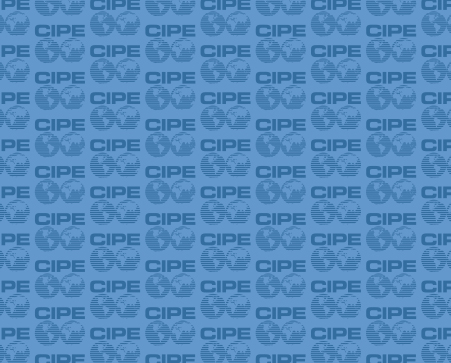
Naledi Modisaatsone is a CIPE-Atlas Corps Think Tank LINKS Fellow at the Urban Institute.
Africa is in the news. The U.S.-Africa Leaders’ Summit is being held in August, the first of its kind. President Obama will be welcoming leaders from across the African continent to the nation’s capital in less than two months. The summit holds many promises; it could mark a turning point in U.S-Africa relations.
While there are many issues that can be discussed, not all of them should be on the agenda for this summit. To achieve the maximum benefits, it is very critical for African leaders to prioritize just what to put on agenda, and what to leave out. It is tempting to want to bring all the issues, but highly focused interactions are more successful. Topics for discussion should reflect the most critical issues regarding African economies and address challenges to sustainable growth and development.
One important issue is private sector development. Development finance and private sector entrepreneurship are powerful, but under-utilized, assets for development in Africa. While most countries have set goals for inclusive growth, they will not be achieved without better harnessing private sector resources that are ultimately the drivers of development.Modern financing and risk mitigation instruments can be better used in a myriad of ways, including to address market failures, expand markets, stimulate domestic resource mobilization, spur innovation, promote women’s economic empowerment, attract investment in vital infrastructure, and unleash inclusive growth. Enabling African countries to participate more equally and profitably in global trade is a straightforward way to support job creation, private investment, and poverty reduction while better engaging traditionally marginalized groups.
For those fast-growing African economies such as Angola, Mozambique, Ethiopia, Ghana, and so on, there is a unique window of opportunity – as African optimism is at an all-time high in global markets – to access these foreign capital markets around the world. Emerging market capital in particular, with an appetite for slightly higher risk premiums, should be targeted by African governments seeking to pursue an investment-led growth path. As explored in more detail in Foresight Africa 2014, more proactive engagement between African governments and African firms with emerging market financial institutions is essential in unlocking nontraditional portals of finance for economic growth and development.
There are many opportunities and challenges associated with rapid urbanization in Africa. As stated in the Urban Institute’s Urban Service Delivery Assessment Framework, urbanization has traditionally been seen as giving rise to congestion and the concentration of poverty in urban slums. When the public sector is not managed well and urban areas are politically neglected or deprived of the freedom to manage their own affairs in an inclusive and accountable manner, or when cities are deprived of the finance resources necessary to provide for their infrastructure needs, cities can become centers for concentrated poverty, traffic congestion, decaying infrastructure, urban blight, and hotbeds for social tension.
At the same time, cities serve as centers of economic, social and political development. As populations become more spatially concentrated and easier to reach, urbanization further provides an opportunity to improve education and other public services and to achieve more sustainable development. Indeed, the success of most countries that have achieved sustainable economic growth, responsive governance, and social inclusion is often closely tied to the success of their urban areas.
Power Africa is a great initiative and should definitely be on the agenda. Africa has tremendous untapped sources for sustainable energy generation. The region hosts vast reserves of natural resources, from geothermal and natural gas reserves to hydro and solar power potential. Tapping into these plentiful, sustainable resources will advance efforts to mitigate the effects of climate change, promote economic development, and improve education and health care.
African leaders should explore all issues surrounding the energy sector: clean energy technologies, increased power generation, rural electrification, regional integration, oil and gas development, policies and regulatory issues, investment opportunities, and financing. Out of these topics, discussions should focus on improving Africa’s energy development capacity, networking African countries in energy export and sale, making Africa’s political and legal framework conducive to energy development, and financial alternatives for energy development along with investment in energy
Of course there are more issues than the aforementioned three: harnessing the private sector, urbanization, and energy. African leaders should come armed with strategies of engagement that result in mutual benefits to both United States and Africa.
The summit should not be a session for the fulfillment of objectives that only benefit Africa. A unified and coherent strategy is important for both this summit, and U.S.-Africa relations.
CIPE-Atlas Corps Think Tank LINKS Fellowship brings talented young professionals with strong research backgrounds to shadow researchers and experts at leading U.S. think tanks for six months. NalediModisaatsone is part of the Fellowship, serving at the Urban Institute.
Published Date: June 13, 2014
